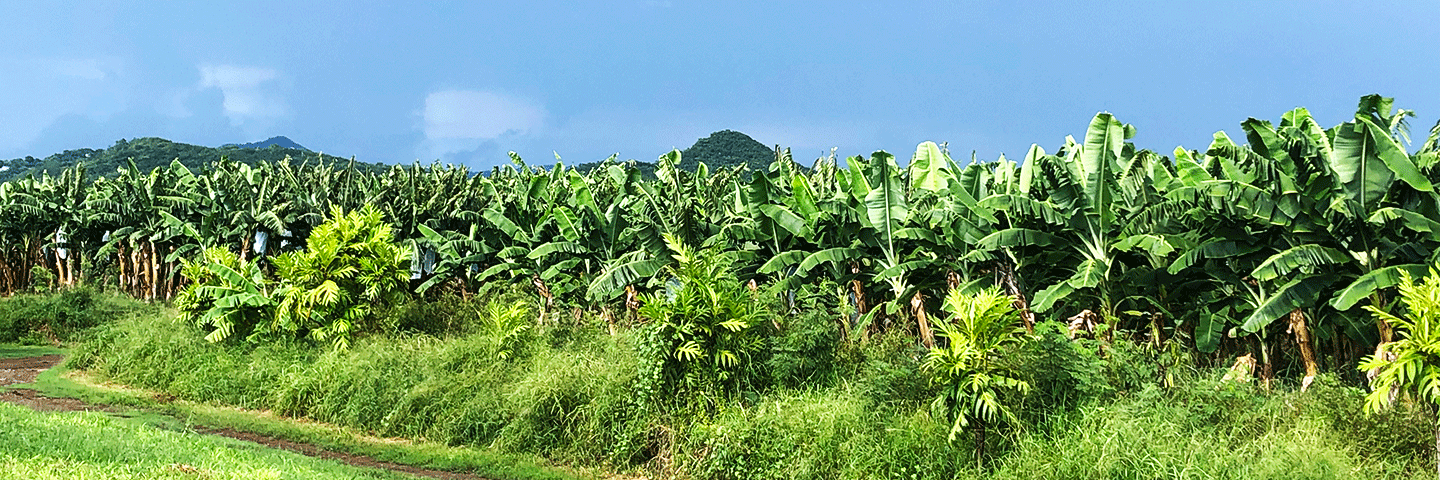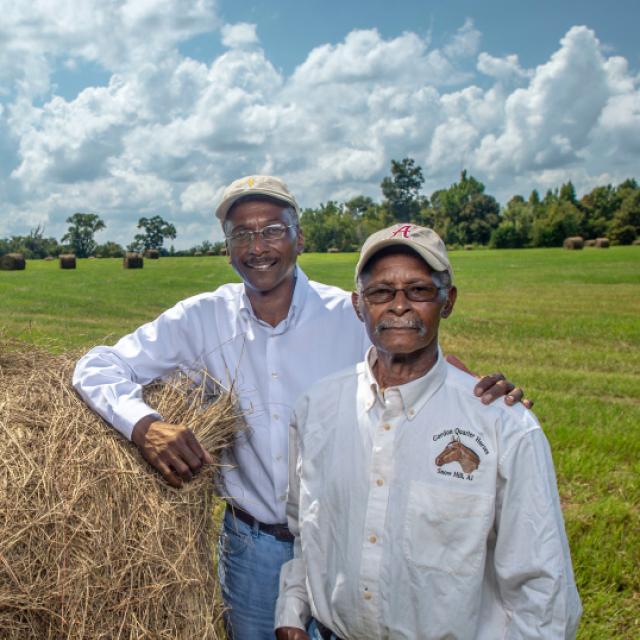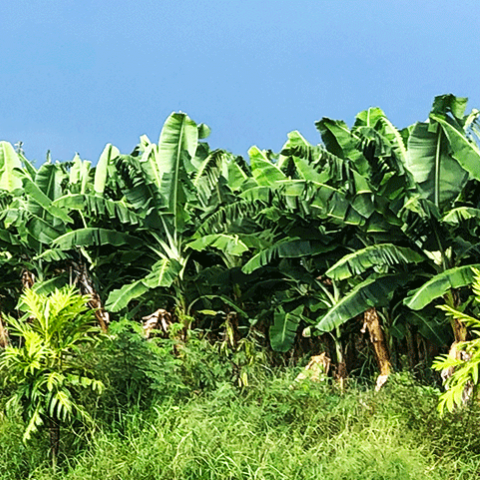Press Release

Caribbean Area NRCS has up to $500,000 in FY 2024 Conservation Innovation Grants (CIG) funding to stimulate the development and adoption of innovative conservation approaches and technologies in conjunction with agricultural production in Puerto Rico and the US Virgin Islands.
Through creative problem solving and innovation, CIG partners work to address our nation's water quality, air quality, soil health and wildlife habitat challenges, all while improving agricultural operations.
There are three annual Conservation Innovation Grants funding opportunities:
CIG Classic
National competition for projects that support the early-stage development and piloting of new tools, practices and technologies to further natural resource conservation on private lands.
CIG On-Farm Conservation Innovation Trials (On-Farm Trials)
National competition for projects that support more widespread adoption and evaluation of innovative conservation approaches in partnership with agricultural producers. On-Farm Trials Awardees provide technical assistance and incentive payments to producers to help compensate for risks associated with implementation of new conservation practices, systems and approaches. Awardees also evaluate the environmental, financial and social (to the extent possible) impacts of implementing innovative approaches. The Soil Health Demo Trial is a priority within the On-Farm Trials competition which focuses exclusively on implementation of conservation practices and systems that improve soil health.
State CIG Classic
State-level competitions for projects that support early-stage development and piloting of new tools, practices and technologies to further natural resource conservation on private lands. While the overall goal and approach match those of CIG Classic, CIG state competitions fund projects that target state-identified conservation priorities. Each year, NRCS state offices may elect to administer their own CIG competitions. State CIG competitions are announced separately from national competitions.
Explore CIG
CIG Projects


CIG Projects
Since its inception in 2004, CIG has funded hundreds of projects, boosting natural resource conservation while helping producers improve the health of their operations for the future.
For Applicants


For Applicants
Information for applicants on the CIG program and how to apply.
For Grantees


For Grantees
Information for grantees who have been awarded funding for a CIG project.
Success Stories


Success Stories
CIG is making an impact across the country
2024 Caribbean CIG
Applications are requested from eligible government agencies, non-governmental organizations or groups. CIG will fund single and multi-year projects, not to exceed 3 years (awards expected to be executed by July 30, 2024). Funds are awarded through a competitive process. The maximum award amount for any individual project will not exceed $100,000 in FY 2024. At least 10 percent of the total funds available for CIG in FY 2024 will be set aside for proposals from Historically Underserved producers, veteran farmers or ranchers, or community-based organizations comprised of or representing these entities. The closing date to submit 2024 applications is May 15, 2024.
You may apply via grants.gov
2024 Caribbean CIG Orientation Webinar
We hosted a FY 2024 CIG orientation webinar on April 9, 2024, at 9:00 am AST, through Microsoft Teams. During the webinar, we provided a presentation related to the FY 2024 Notice of Funding Opportunity and answered questions regarding the CIG opportunity.
Feel free to review the webinar recording if you are interested in submitting a proposal.
See webinar presentation here:
Caribbean Area CIG Priorities for 2024
For Fiscal Year 2024, CIG will focus on the following topics – one or more may be selected for proposals:
- Water Quality
- Field testing of conservation practices
- Community-level or landscape-level strategies
- Development of innovative or repurposed planning tools, guidance documents, or conservation practices implementation scenarios
- Field testing of innovative production techniques
- Evaluation of enhanced nutrient management technologies
- Leveraging of community resources
- Water Harvesting on Dry Lands
- Field testing of conservation practices
- Development of innovative or repurposed planning tools, guidance
documents, or new conservation practices implementation scenarios - Evaluation of enhanced water harvesting on dry lands technologies
- Leveraging of community resources
- Climate-Smart Agriculture
- Development of innovative or repurposed planning tools, guidance documents, or conservation practices implementation scenarios
- Field testing of innovative production techniques
- Field testing of conservation practices or implementation scenario validation
- Community-level or landscape-level strategies
- Communication tools and strategies that help producers interpret local climate related risks
- Introduction of new or enhanced cropping systems or non-traditional crops
- Introduction of new or enhanced grazing management systems
- Introduction of new or enhanced forestry management systems
- Improved operation management
- Leveraging of community resources
- Integration of traditional, cultural or indigenous farming knowledge
- Conservation in Urban Agricultural Systems
- Demonstration of the natural resource impacts or economic benefits
- Projects that show conservation benefits with the implementation of alley
cropping, multistory cropping, urban forestry, or integrated/mixed systems - Development and evaluation of the effectiveness of innovative management systems or emerging and innovative technologies
- Interpreting existing conservation practices
- Invasive Species Control
- Innovations for private landowners to more effectively prevent, detect, or combat invasive species to maintain healthy and productive working lands
- Innovative strategic approaches
- Reimagination of existing strategies
- Early Detection and Rapid Response (EDRR)
- Innovative Local Scale Waste Management Systems
- Field testing of conservation practices
- Community-level strategies
- Development of innovative or repurposed planning tools, guidance documents, or new conservation practices implementation scenarios
- Evaluation of enhanced waste management technologies
- Leveraging of community resources
More information
Clink on the link for more information on how to apply to CIG, including webinars, sample grant application documents, and guides to federal grant applications.
You may apply to the FY 2024 CIG via grants.gov.
Publications
Hoja Informativa para CIG en el Area del Caribe
(172.32 KB)
Contact
- Caribbean Area CIG Coordinator: Mario Rodriguez, 787-766-5065, 787-452-5852
Additional Information
Learn about past Caribbean CIG Awardees
Caribbean CIG Awardees
NRCS has been funding Caribbean-specific Conservation Innovation Grants (CIG) to stimulate the development and adoption of innovative conservation approaches and technologies in conjunction with agricultural production for over 20 years. Here are some of our awardees.
Learn MoreReady to get started?
Contact your local service center to start your application.
How to Get Assistance
Do you farm or ranch and want to make improvements to the land that you own or lease?
Natural Resources Conservation Service offers technical and financial assistance to help farmers, ranchers and forest landowners.

To get started with NRCS, we recommend you stop by your local NRCS field office. We’ll discuss your vision for your land.
NRCS provides landowners with free technical assistance, or advice, for their land. Common technical assistance includes: resource assessment, practice design and resource monitoring. Your conservation planner will help you determine if financial assistance is right for you.
We’ll walk you through the application process. To get started on applying for financial assistance, we’ll work with you:
- To fill out an AD 1026, which ensures a conservation plan is in place before lands with highly erodible soils are farmed. It also ensures that identified wetland areas are protected.
- To meet other eligibility certifications.
Once complete, we’ll work with you on the application, or CPA 1200.
Applications for most programs are accepted on a continuous basis, but they’re considered for funding in different ranking periods. Be sure to ask your local NRCS district conservationist about the deadline for the ranking period to ensure you turn in your application in time.
As part of the application process, we’ll check to see if you are eligible. To do this, you’ll need to bring:
- An official tax ID (Social Security number or an employer ID)
- A property deed or lease agreement to show you have control of the property; and
- A farm number.
If you don’t have a farm number, you can get one from USDA’s Farm Service Agency. Typically, the local FSA office is located in the same building as the local NRCS office. You only need a farm number if you’re interested in financial assistance.
NRCS will take a look at the applications and rank them according to local resource concerns, the amount of conservation benefits the work will provide and the needs of applicants. View Application Ranking Dates by State.
If you’re selected, you can choose whether to sign the contract for the work to be done.
Once you sign the contract, you’ll be provided standards and specifications for completing the practice or practices, and then you will have a specified amount of time to implement. Once the work is implemented and inspected, you’ll be paid the rate of compensation for the work if it meets NRCS standards and specifications.


